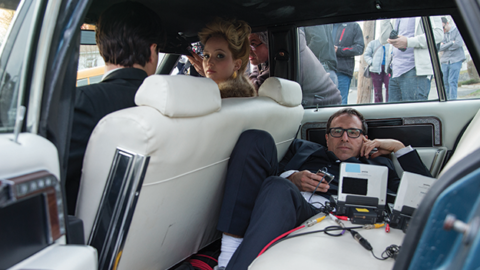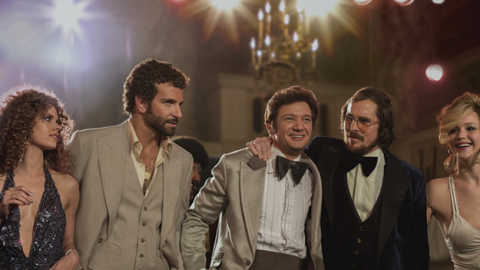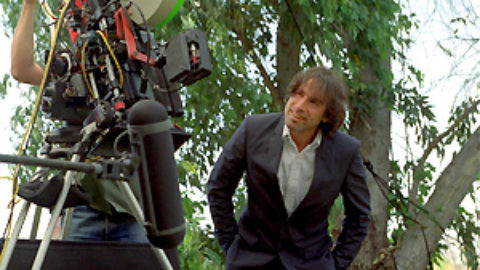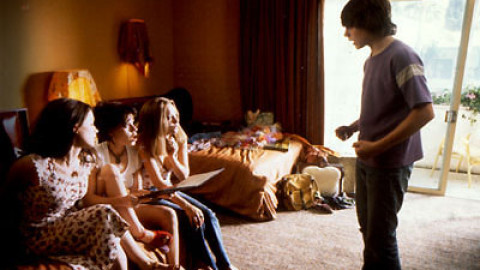Film of the Week: Joy
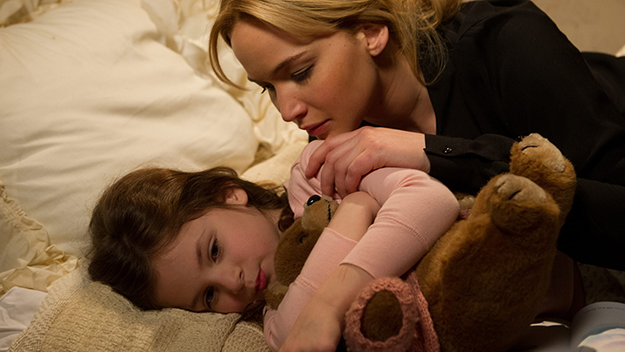
There’s a very high WTF factor to David O. Russell’s comedy-drama Joy. Early on, when his heroine (Jennifer Lawrence) is working at an airport desk, Russell’s camera sweeps briskly past a long, angry queue. “What’s your name? ‘Joy’?” rasps a discontented customer. “You don’t seem so joyous to me today!”
Both these effects, the rushing camera move and the dyspeptic one-liner, are fun, yet both seem to be fundamentally superfluous—flashy bits of garnish that don’t seem in any way intrinsic to the film. Well, Russell has long had a reputation as a director who doesn’t like either himself or us to get bored, and this twitchiness has made him one of the most unpredictable—or just plain uneven—filmmakers in contemporary Hollywood. It means that he can dazzle with an unpretentiously bustling blue-collar drama like The Fighter—arguably his most substantial film to date—and an all-out fireworks display such as American Hustle, an exuberant retro riff that was a more juicily Scorsesean film than its contemporary on the release circuit, The Wolf of Wall Street.
But then you get an infuriating piece of extended facetiousness such as I Heart Huckabees—and while Joy is far more confident and to the point than that misshapen UFO, it’s very nearly as puzzling. Joy is a type of film that few serious film-makers attempt these days—an honest-to-God rags-to-riches success story. It’s a thinly disguised biopic of American inventor and entrepreneur Joy Mangano, creator of the self-wringing Miracle Mop (and other modern marvels, unfortunately not featured here, such as Huggable Hangers and the Forever Fragrant odor neutralizer range). Joy is specifically about the tormented birth pangs of Mangano’s mop, but as shoppers know, it all worked out fine. The tagline could have been: “She created a mop. She cleaned up.”
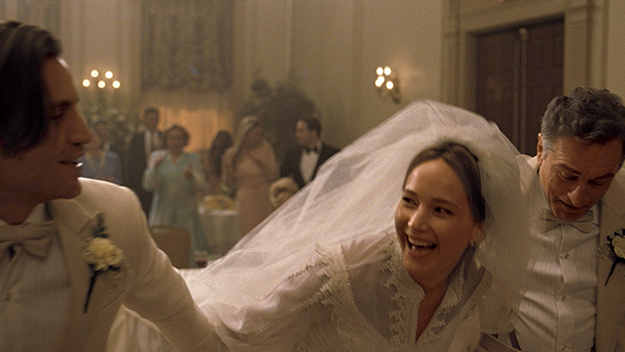
The film, as two captions announce at the beginning, is “Inspired by true stories of daring women… [beat] One in particular.” It all starts with a snowbound evocation of the working-class childhood of Joy (played as a girl by Isabella Crovetti-Cramp), a plucky, wide-eyed kid first seen playing in the snow. In her room, she makes paper models of an ideal happy home, prompting her half-sister Peggy to tell her she needs a handsome prince. “I don’t need a prince,” says Joy—but growing up, she saddles herself with one anyway.
The action cuts to Joy as an adult, in a cluttered and ostentatiously dysfunctional household. Her parents are divorced; her mother Terry (Virginia Madsen) sits in bed all day watching TV soaps, while dad Rudy (Robert De Niro), who runs a repair shop, has been sent back home as “damaged” by the woman he left Terry for. Dad is made to move into the basement along with Joy’s ex-husband Tony (Edgar Ramirez), a charming Venezuelan crooner who never quite fulfilled his promise as a Latino Tom Jones, and never got it together to move out either. All Joy’s childhood dreams have turned sour—beginning, it seems, at the moment that her parents egregiously failed to patent for her the quick release dog collar that she invented and could have made a mint from.
Joy is desperate to break out of her life’s dull prison, but her big moment will be purely serendipitous. Dad starts dating wealthy Italian widow Trudy (a madcap Isabella Rossellini, relishing every barked imprecation and wagged finger). Trudy invites her new beau’s family to join her on board her late husband’s boat, but no red wine—“It might stain the teak! wood! deck!” Sure enough, wine is spilled, Joy gets down on all fours to wipe up the mess—and has a eureka moment as she realizes that mops ought really to be better. Like every good inventor in the movies, she first starts muttering aloud—then dashes upstairs to do some sketches (“Three hundred feet of continuous cotton loops, that’s what I drew”). Hoping for finance from Rudy’s squeeze, she satisfactorily answers the dead husband’s “Four Questions of Financial Worthiness” despite Trudy’s reservations (“It is possible that she is a fatally flawed underachiever”). Soon a Latina workforce (none of whom, it should be said, get to be characters as such) move into Joy’s basement to start assembling the product.
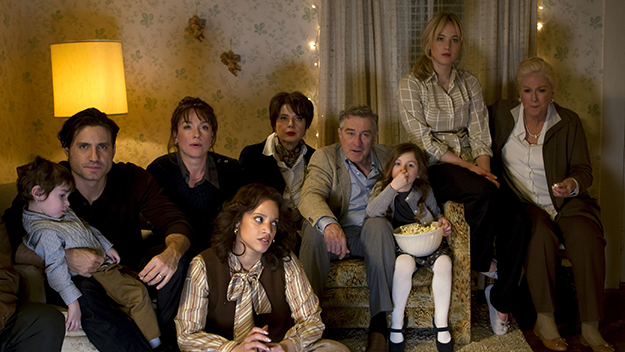
The film’s script—by Russell and Bridesmaids co-creator Annie Mumolo—proves, from here on, to be interested more than anything in the selling of Joy’s creation. We go from the sneaky pitch in supermarket car parks (“Self-wringing, huh?”), to a visit to the headquarters of shopping channel QVC, where Joy sits in a waiting room that’s like a vast chapel—one of the moments at which the film most clearly appears to be attempting some kind of satire. It’s hard to know whether QVC exec Neil Walker (Bradley Cooper) is being presented as a friend or a foe, a white knight or a jerk—he’s the one who eventually gives Joy her big chance, but he introduces himself with a long droning speech about how Barry Diller entrusted him with a key position, a piece of media-world shop talk that won’t mean a great deal to general audiences, and certainly didn’t mean a great deal to me.
The rest of the story is fairly predictable—Joy fails at first, then succeeds, suffers a seemingly insuperable reversal of fortune, yet beats the odds. She learns to work the TV system on her terms, refusing to dress in the standard Eighties home-shopping uniform: “I wear a blouse and I wear pants. This is who I am.” The narrative gets bogged down in an intrigue involving a patent dispute, but Russell gets himself out of these doldrums by treating the rest first like a thriller (Joy infiltrates a lowlife’s warehouse), then like a Western, as she strides across a Dallas street to a showdown with a Stetsoned enemy—having first cropped her hair for the occasion, like Joan of Arc on the eve of battle. Russell makes such heavy weather of Joy’s warrior-woman intrepidity, it’s a wonder he didn’t kit her out with Katniss Everdeen’s bow and arrow for this sequence: mirror shades and leather jacket must suffice.
It’s really hard to tell whether Russell intends to tell a straight-up inspirational poor-girl-made-good narrative or to spin the whole thing for satire. There are wry flashes in the whole TV-world sequence—most obviously betokened by the presence of Joan Rivers (played by her own daughter Melissa Rivers)—but when the calls start coming in, and the mop proves a hit, we seem genuinely to be dealing with the same kind of triumphant epiphany you’d find in a sports movie.
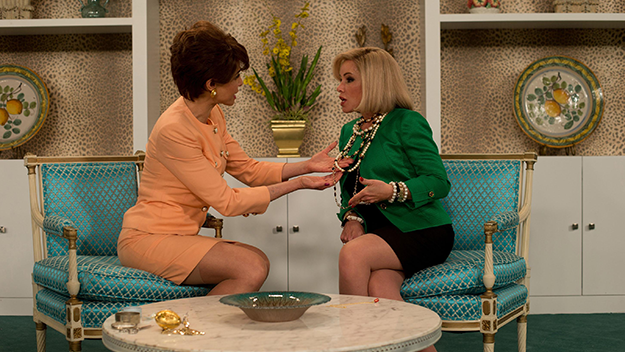
If it’s hard to gauge exactly what Joy has in mind throughout, it’s because Russell seems to try whatever works, whenever it comes into his head. It’s also partly because the film is so bizarrely narrated—it’s told, for a start, in intermittent voiceover by Joy’s loving grandmother (Diane Ladd). She is actually dead during much of the action, but nevertheless narrates as if from the afterlife (and in any case, makes a twinkly-eyed posthumous appearance at her own funeral: “I felt I wanted to stay near her and watch over her”). Grandma Mimi’s omniscient narrative has a Hallmark card coziness—“She couldn’t know that one day she would move into a beautiful house…”—but it’s hard to know whether or not we’re supposed to perceive this as being as hokey as the TV soap parodies that are interspersed throughout (and which come across as joylessly stilted, even by the standards of the real thing).
Joy is for the most part a bewildering mess—possibly because its four credited editors are a sign of structural problems, possibly just because Russell throws too much directorial dash at us when he should be making things simple. For example, there’s barely a character here that isn’t introduced with some sort of demented flourish—like Tony, first seen singing a salsa version of “Mama Told Me Not to Come”—but who subsequently remains just a personable pillar of strength hovering in the background. Grandma is barely there, a mere wraith in the making, while Virginia Madsen is mainly kept at a distance behind a huge pair of Eighties spectacles. Apart from a cheerfully crazed Rossellini, the person who has most fun is De Niro, who seems—on the evidence of this and Silver Linings Playbook—to perk up for Russell as for no other director these days. He’s doing the same kind of curmudgeonly routine as in that other film, but gets some great lines to do it with, whether delivering a singularly off-message wedding speech, or sniping at his ex: “Of course I’m disturbed—you’re the Great Disturber!” As for Lawrence, who got to play the bristling comedienne in American Hustle in a way we’d never seen before, she doesn’t have anything like as rewarding a role here. She gets her big angry, determined moments—(“Never speak—on my behalf—about my business!”) but for much of the film, Joy is a closed-off paragon of forbearance and determination, her smooth face oddly, even unsettlingly mask-like. Nevertheless, Lawrence’s opacity lends a certain chilly reserve and ambivalence to a film that’s otherwise often outrageously clunky and on the nose, especially in the musical choices: Sinatra’s “The Good Life” for a yacht ride, Cream’s “I Feel Free” for the triumphant finale? Really?
However, there is ambivalence of a very weird sort, especially in the repeated association of Joy with falling snow, and her placing in cold white refrigerator-like environments that suggest, over the course of the film, that she only survives by hardening like ice. A late flash-forward to Joy’s future shows her in a luxurious mansion, sitting at her desk dispensing benevolence to two humble petitioners who hope that she’ll back their invention: she’s magnanimous and gracious because she’s been in their position. But perhaps that crisply perfect white suit she now wears tells its own story. We also see her in this part of the film ruefully inspecting her old paper fence and tree, now crumpled—her very own Rosebuds. For what is the film, after all, but Russell’s very own female-skewed Citizen Klean?



